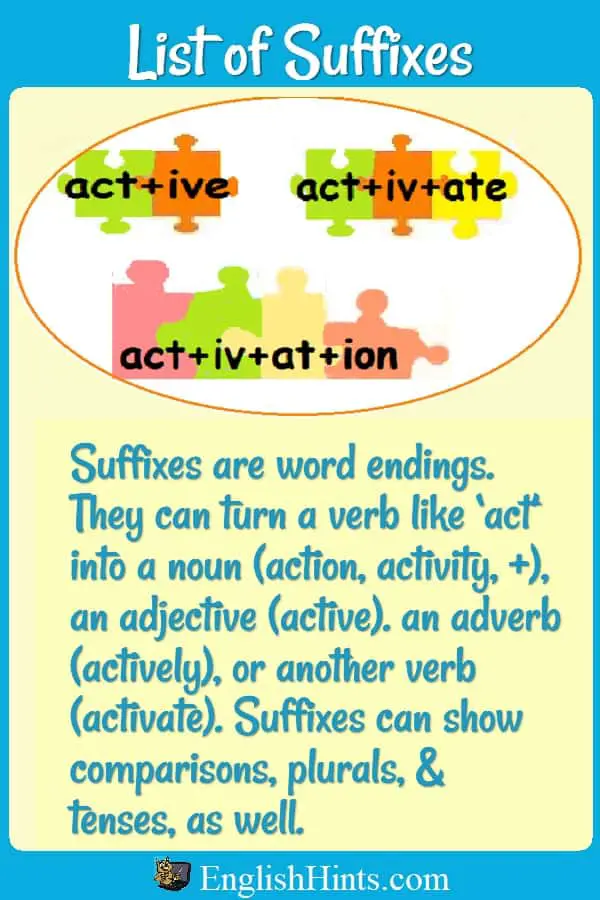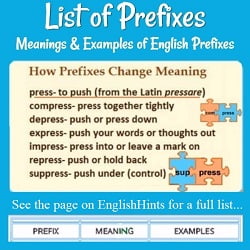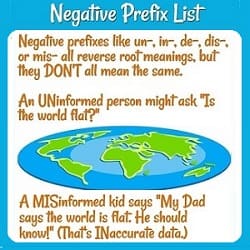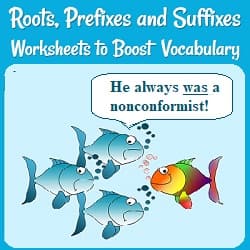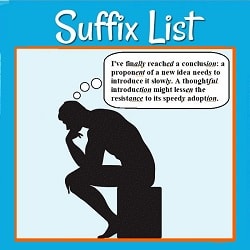List of Suffixes:
45+ Useful Word Endings
Use this alphabetical list of suffixes to find information about the meanings and uses of different word endings in English.
Suffixes show
- where to use a word in a sentence,
- when something happened,
- whether there are one or more things, etc.
Some suffixes identify nouns, adjectives, adverbs, and verbs.
(These can also be used to change the part of speech. Add ‘-ment’ to ‘govern’ to change it from a verb to a noun, so it can take a different place in a sentence.)
Other common suffixes show tenses, plurals, and comparisons.
To keep this page from being extremely long, I moved an explanation of suffix types to Suffix List Arranged by Use. It also gives more examples.
The links to each section in the list will take you to the correct part of that page.
The list of suffixes below gives each suffix, its use (and meaning when needed), and 1-3 examples. (If it shows the word's part of speech, it will say Adj, N, V, etc. (I didn't write "used to show that this word is an adjective "--or noun, etc.-- each time.)
Several suffixes have two listings because they have more than one use. Also, some of the listings actually cover two related uses. For example, -en is an irregular past participle ending for verbs like to eat and to write. Those past participles can be used as adjectives (a half-eaten apple or a written test.)
-En can also be added to nouns or adjectives to make them into verbs. Examples include to brighten, lengthen, straighten, or whiten.
When you know these word-building suffixes, you can guess the part of speech (the role) of a new word, and how to use it correctly.
Study the examples below. If any words are new to you, do you recognize any parts? Can you figure out their meanings?
Many of these are cognates-- close relatives-- to words in Spanish or related languages. For example,
English
1. clarity
2. to clarify
3. clarification
Spanish
1. la claridad
2. clarificar
3. la clarificación
English
4. visible
5. visibly
6. visibility
Spanish
4. visible
5. visiblemente
6. la visibilidad
If you know that the English suffix ‘-ity’ is like the Spanish ‘-idad’, or ‘-ify’ like “-ificar’, you can recognize many other words with the same suffix. (Do remember that the way we use the words in English may be different, though the basic sense is usually similar.) Watch for examples of other cognates below.
Organized? organization? organize?
Check your suffix skills:
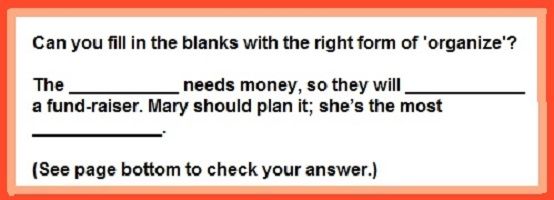
Use the links below to go straight to the Suffix List's explanation for that use (and the back button to return here.)
The list of suffixes is right below these links.
Section abbreviations and links for the suffix list:
Adj: for Adjectives
Adv: for Adverbs,
N: for Nouns,
NP: for Nouns -- Groups of People,
V: for Verbs
also: pl= plural, 3ps= 3rd person singular
Alphabetical List of Suffixes
- -able: Adj (able)-- dependable, valuable
- -al: Adj-- original, typical
- -an: NP (belonging to; see -ian)-- Korean, Mexican
- -ance: N (see -ant 1)-- reliance, significance
- -ancy: N (see -ant 1)-- constancy
- -ant 1: Adj-- constant, reliant, significant
- -ant 2: NP-- attendant, participant
- -ar: NP (person who __; see -er 2)-- beggar
- -ary: Adj-- primary, secondary
- -ate: V-- coordinate, differentiate
- -ed: Adj or tense (PT)-- bored, coordinated, tired
- -ee: NP (person who receives an action)--nominee, refugee
- -en 1: Adj or tense (PT)-- eaten, written
- -en 2: V (to make __)-- lengthen, tighten
- -ence: N (see -ent 1)-- influence, persistence
- -ency: N (see -ent1)-- efficiency, emergency
- -ent 1: Adj-- efficient, persistent
- -ent 2: NP-- resident
- -er 1: CP (Adj)-- busier, taller
- -er 2: NP (person who __)-- baker, consumer, teacher
- -es 1: pl-PT (N; see -s 1)-- candies, dishes, toes
- -es 2: 3ps, PT (see -s 2)-- fixes, washes
- -est: CP (superlative adj)-- busiest, tallest
- -fication: N (see -fy)-- modification, simplification
- -ful: Adj (full of)-- resourceful stressful
- -fy, -ify: V (to make__ )-- classify, modify, simplify
- -ian: NP (see -an)-- Brazilian, musician
- -ible: Adj (able)-- eligible, visible
- -ic: Adj-- basic, sympathetic
- -ing: Adj or tense (PT)-- boring, frightening
- -ion: N (see -ification, -sion & -tion)-- erosion, resolution
- -ish: Adj (similar to)-- boyish, Irish
- -ism: N-- communism, federalism
- -ist: NP (group member)-- chemist, communist, federalist
- -ity: N-- diversity, security
- -ive: Adj-- excessive, productive
- -ize: V-- characterize, organize
- -less: Adj (without)-- effortless, helpless
- -logy: N (study of)-- archeology, geology
- -ly: Adv-- basically, typically, usually
- -ment: N-- assignment, judgment
- -ness: N-- awareness, tiredness
- -or: NP (person who __; see -er 2)-- doctor, sailor
- -ous: Adj-- ambiguous, enormous
- -s 1: pl-PT (N)-- clocks, streets, trees
- -s 2: 3ps, PT-- eats, thinks
- -ship: N-- authorship, relationship
- -sion: N-- expansion, vision
- -tion: N-- classification, reaction
- -y: Adj (presence of)-- cheery, noisy, rainy
Note: All the suffixes labeled 'Aj' make words into adjectives (or show that the word is an adjective). The 'Adv' suffixes mark adverbs, 'Ns' mark nouns, and 'Vs' mark verbs. Their meanings are discussed in each section.
CP suffixes is the abbreviation for adjective comparisons. PT suffixes include suffixes for plurals and tenses. Again, for a more complete explanation see each section on Suffix List.
If you want to teach suffixes (alone or along with prefixes and roots), EnglishHints has several lesson packets. See Root, Prefix, and Suffix Worksheets. Packets include the information here plus teaching suggestions and games.
The basic suffix packet is free. The complete suffix pdf or combination bundles are inexpensive. They have lots of time-saving teaching ideas.
Suffix List by Use has an explanation and more examples of each type of suffix. It lets you see all the suffixes of each type together. (That grouping may make it easier to understand and learn them.)
For practice with suffixes showing parts of speech, see
- Word Family Practice, and
More Related Pages
Do you wonder what a prefix means? This alphabetical listing gives about 50 of the most useful English prefixes.
The explanations & examples in this negative prefix list can help you use them without confusion.
Knowing a few roots & prefixes can help you figure out meanings of new words.
Organized?... Answers:
The organization needs money, so they will organize a fund-raiser. Mary should plan it; she’s the most organized.
After ‘the,’ we need a noun: organization. After the modal verb ‘will,’ we need the base (infinitive) form of a verb: organize. Then we need an adjective describing Mary. ‘Organized’ (from the past participle of the verb) will work there. (We could also say "Mary is a real organizer!")
Didn't find what you
needed? Explain what you want in the search box below.
(For example, cognates, past tense practice, or 'get along with.') Click to see the related pages on EnglishHints.
| site search by freefind | advanced |
Be sure to check out Word Families for an explanation of how roots, prefixes, and suffixes work together and the parts of speech formed by different suffixes.
